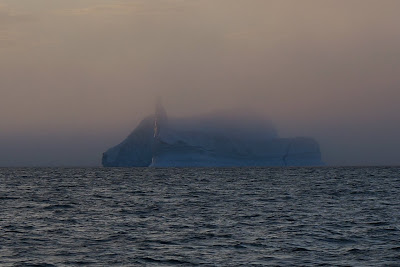The experts, from Bill Tilman to Robin Knox-Johnston, are categorical in their advice: to sail the icy waters of Greenland you must have a reliable engine.
Luckily we did - or thought we did right up to the moment it failed to start.
While Siggi tried to get it going we had time for another hike up to the lookout over the fjord (above).
It was remarkable how different the view felt when you're not sure how you're going to escape, and the weather was suitably chilly with a harsh light.
I decided to treat this episode as an adventure, the sort of thing that Scoresby and co wouldn't have batted an eyelid at, and used the time to think through our situation.
There was no Solent Coastguard, listening patiently on channel 16, let alone the hunters on the locally used C08, which was a shame as they could have been very useful.
Given an outside tow wasn't possible, what were the options? We couldn't kedge as the fjord is too deep (I mean really deep, in places deeper than the Denmark Straits) and we couldn't sail out as the anchorage in Suheili Bugt was too well sheltered.
But there was one workable solution - towing ourselves using the Zodiac and its outboard engine. However it would need the tide to be flowing out with negligible wind in the fjord.
And by golly on the Thursday late afternoon that's exactly what we had, as as quick look at the water level showed it was just after high water.
As Nelson would have put it: "lose not an hour"!
So off we went, me, R. and L in the Zodiac, not my most favourite of methods of transport, with two thoughts high in my mind:
- It was going to take a long time to reach the fjord's opening where the wind would be strong enough to give the boat steerage way (three hours was my guess as I stepped off Aurora)
- It really wouldn't be a good thing if something went wrong, as the route was rather wiggly close to various rocks plus of course icebergs
This graphic from Google Earth shows our approximate route at the start, and for scale the red line is about 1 NM in length (and of course the ice wasn't at those locations though the density isn't far off):
One view was that we should do a big bowline to make a V-shape around handles on the inflatable but another view was that this could cause problems such as drag its stern down and threaten to wrap the rope around the prop.
As we wanted to avoid any problems with this operation, instead we went for the more controllable human approach in which I was basically a cleat controlling the rope's direction and L. anchored the tow line's weight while R. was in charge of the outboard.
It felt like a very long three hours, which is what it indeed took to get us out of the fjord.
What was really frustrating was that there was just an amazingly stunningly beautiful sunset and I had my camera in my pocket but couldn't reach it as had to hold onto that darn tow line all the way out.
I think the others might have taken pictures: I'm just hoping not too many of me straining to keep that tow rope high enough not to decapitate R. or fray on the fuel cap of the outboard (which we had to re-fill half way out).
Eventually, close to Overhand Mountain, we were called on-board: the boat was finally sailing. It might have been only a knot or two but that was fine by us.
As we crept out of the fjord we picked up speed, and I remember steering Aurora between icebergs at a wacky 3 knots.
Finally we were clear and I had time for one last pic of Kangerdlugssuaq Fjord as we headed out to open seas and safety:
Yet again the weather had captured the mood perfectly.
Updated: I've just seen that the latest Yachting Monthly has an article on towing a yacht with an inflatable and outboard from none other than Tom Cunliffe. I must go and have a read....







.jpg)









































